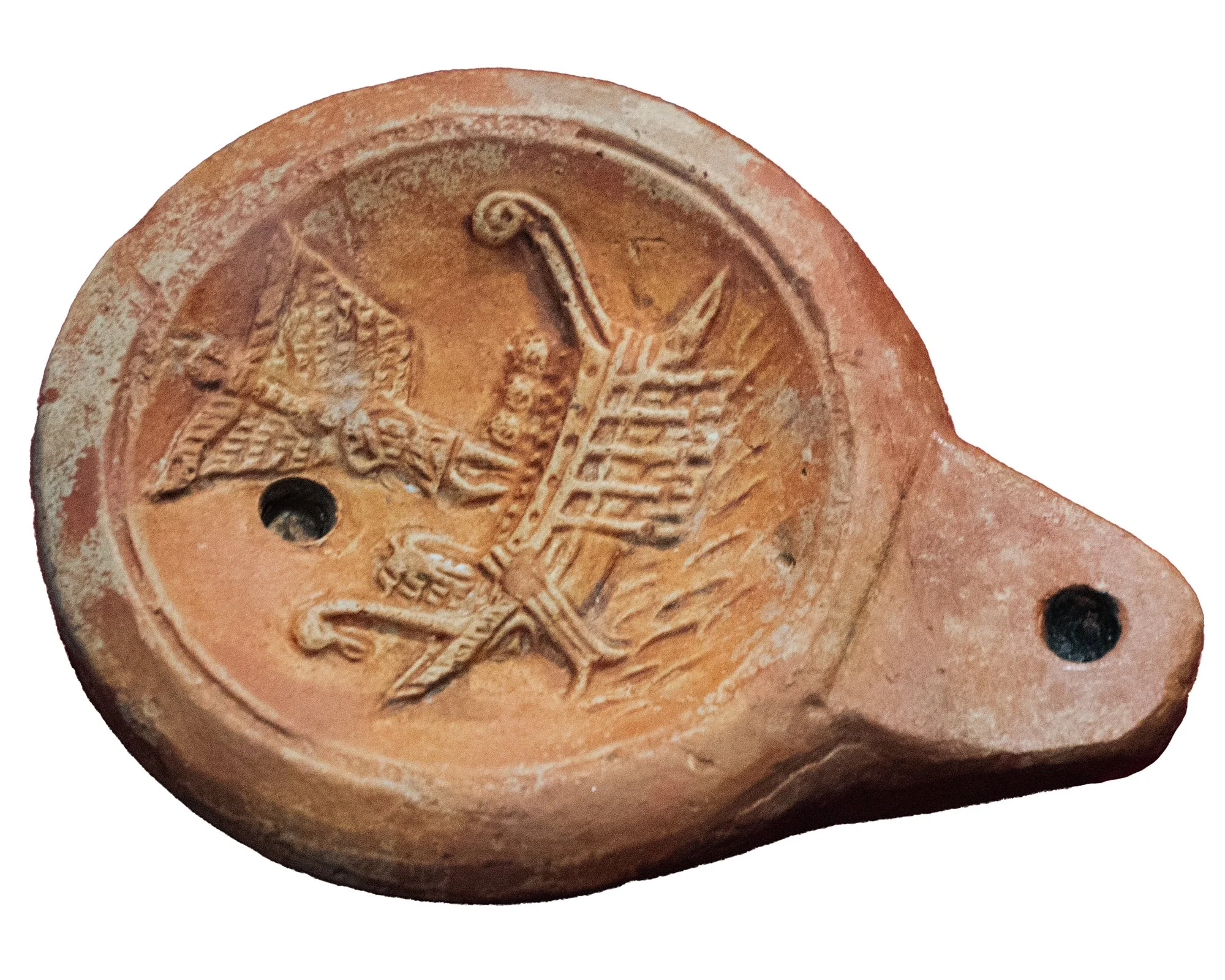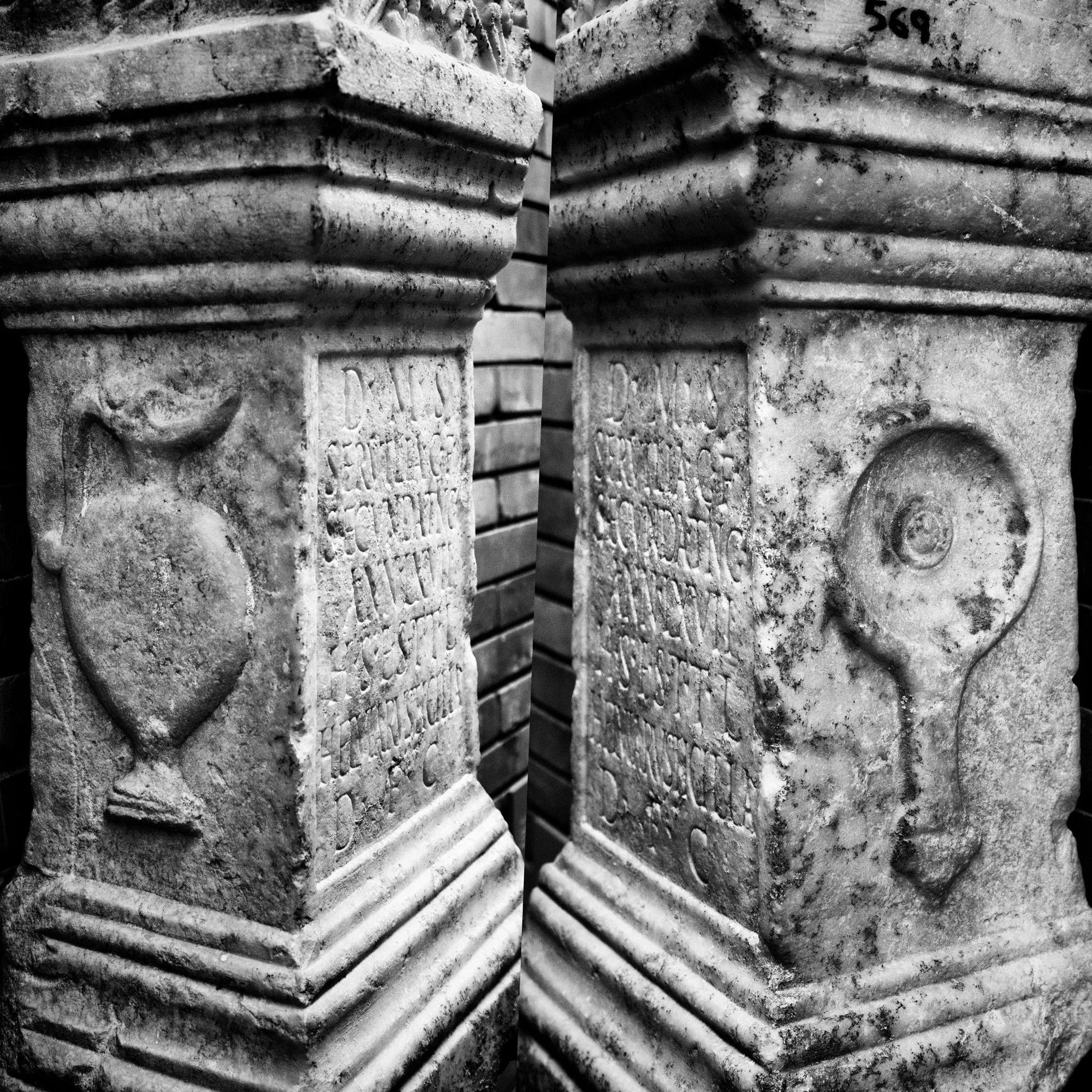In the quiet, sunlit galleries of the Museo Nacional de Arte Romano in Mérida, a simple block of marble tells a story of memory, identity, and farewell. It’s not large—barely 60 centimeters high—but it’s richly carved, crowned with rosettes, adorned with ritual vessels, and inscribed with words of loss and devotion. This is a Roman funerary altar (from the 1st or 2nd century), dedicated nearly two thousand years ago to a woman named Servilia Secunda. She came from Tingis, modern-day Tangier (Marocco), and died in Augusta Emerita, the capital of Roman Lusitania. Her final resting place speaks volumes not just about her, but about how Romans honored their dead.
On the left side of the altar, we see a libation jug (praefericulum): round-bodied, with a short neck and elegant handle. On the right side, a patera—a flat offering bowl—emerges in shallow relief, its handle ending in a ram’s head. Though the marble is weathered, the symbolism is clear: these were the sacred instruments of remembrance.
Rituals of Wine and Memory
In Roman tradition, the dead were not simply buried and forgotten. They were honored with acts of pietas—dutiful care—that continued long after death. On specific days, families would return to the grave with wine, oil, milk, honey, or even water. They would pour these liquids over the tomb or into special libation tubes, believing the offerings nourished the spirits of their loved ones.
The patera and jug depicted on funerary altars like this one from Mérida are not ornamental flourishes. They are icons of ritual. The patera, held in the right hand, was used to pour the libation; the jug replenished it. Together, they signaled to all who passed: this is a place of sacred remembrance. These symbols were often carved on the narrow sides of the altar, carefully oriented so the jug’s spout pointed toward the name of the deceased—visually connecting the act of offering to the person it honored.
In some cases, the handle of the patera was shaped like a ram’s head, as here. This may evoke the purification rituals that followed Roman funerals, where a ram or other animal was sacrificed to cleanse the mourners. The art thus compressed multiple layers of meaning into a single gesture: grief, memory, and spiritual hygiene.
The Woman from Tingis
The inscription on the front of the altar is formal, moving, and deeply Roman in tone:
D(is) M(anibus) s(acrum) / Servilia G(ai!) f(ilia) / Secunda Ting(itana) / ann(orum) LXVII / h(ic) s(ita) e(st) s(it) (t)ibi (terra) l(evis) / Helvia Rusticilla / d(e) (!) f(aciendum) c(uravit)
Meaning: "To the spirits of the dead. Servilia Secunda, daughter of Gaius, from Tingitana, aged 67, lies here. May the earth rest lightly upon you. Helvia Rusticilla took care to have this made."
Though only a few lines, this epitaph offers a wealth of information. We learn Servilia’s full Roman name, her origin from North Africa, her age, and the name of the woman—Helvia Rusticilla—who arranged for this monument. Perhaps she was a friend, relative, or freedwoman. The phrase sit tibi terra levis—“may the earth lie lightly upon you”—is a traditional Roman wish for peace in the afterlife.
A Shared Language of Grief
What’s remarkable is how standard, yet personal, this monument feels. The language, the symbols, the rosettes and garlands—all echo similar altars across the empire. Yet the mention of Tingis hints at migration, at personal history across provinces, at someone who had a life, a journey, and relationships in a distant place before coming to Emerita.
Mérida’s museum contains dozens of such altars, and nearly all feature the patera and jug. Sometimes they are paired with portraits or garlands; sometimes they stand alone. But they always point to the same idea: that the dead were still part of the social world. They could be visited, remembered, fed, and honored. The altar was not a gravestone in our modern sense—it was a sacred platform, ready for the next libation, the next whisper of memory.
Visiting Today
You can see the altar of Servilia Secunda in the Museo Nacional de Arte Romano in Mérida. It is catalogued as “MNAR 569” and sits among dozens of others from the Roman necropolises of Augusta Emerita. Standing before it, you might imagine a friend or daughter placing a small offering of wine into the focus atop the stone, the scent rising like a prayer.
A gesture made for the living—and for the dead.












